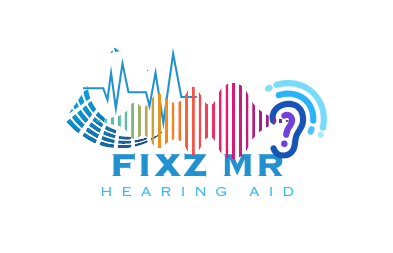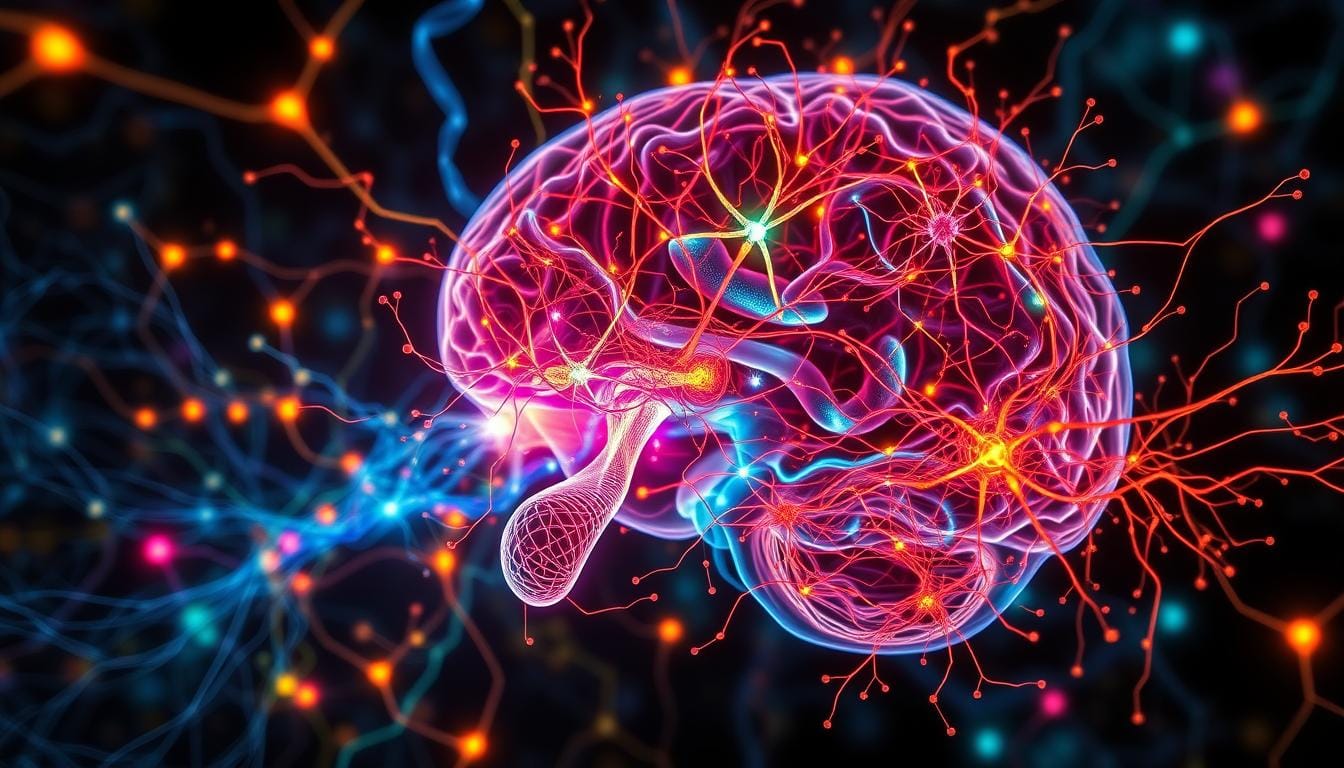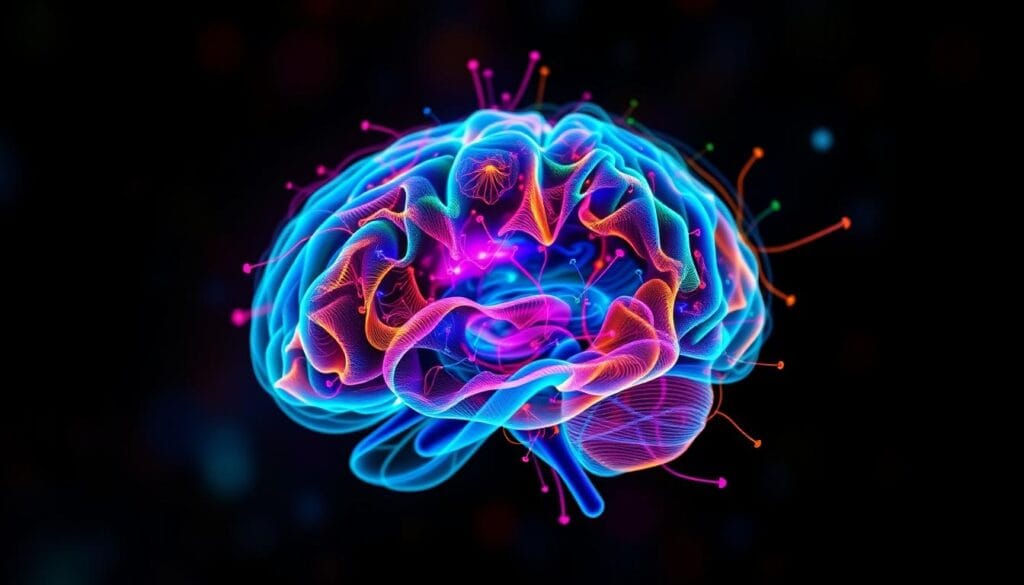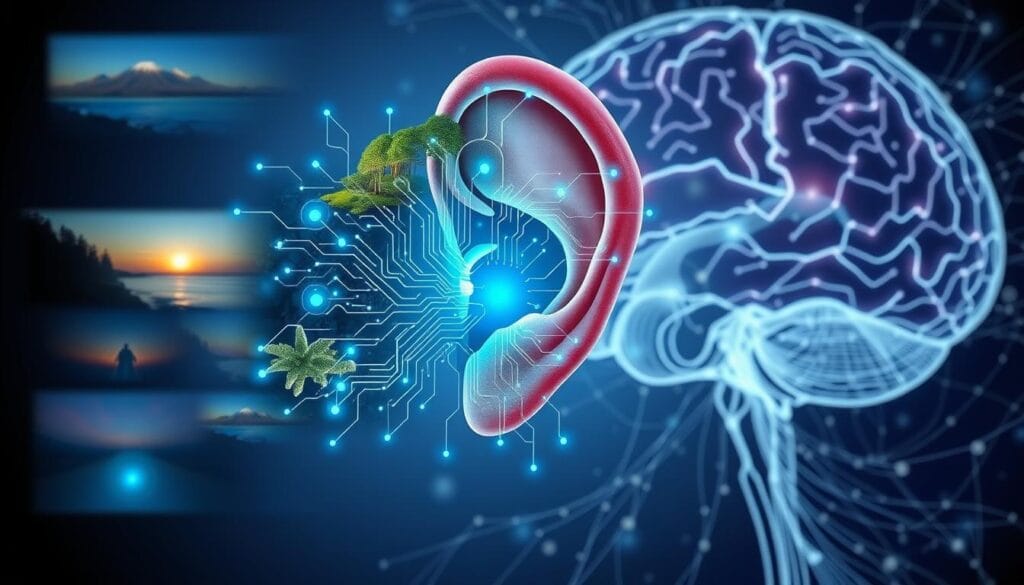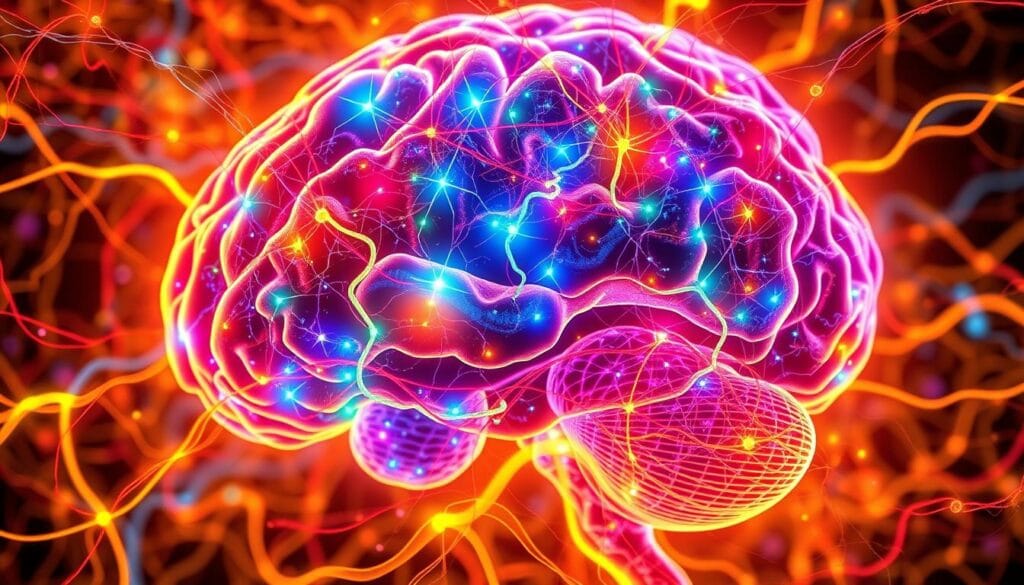Let’s start a journey through the world of hearing and the brain. Scientists like Nina Kraus at Northwestern University have found a deep link between them. They show how our senses shape our thinking and our brain’s structure.
Every sound we hear tells a story of complex processes in our brain. This is thanks to decades of research and over 400 studies by Kraus. Our unique way of hearing shows how our brains work in a special way.
Our brains turn sounds into meaningful information. This helps us keep our thinking skills sharp throughout life. Sounds affect our movement, language, and feelings. Tools like the frequency following response (FFR) help us understand how our brains work with sounds.
Music has a big impact on our thinking and learning. Studies show that music helps children with language skills. Musicians can handle quiet and loud sounds well.
Music in early life can help keep our minds sharp as we age. But it also helps with health and hearing. Things like Cortexi could improve our hearing and brain health together.
Key Takeaways
- The intricate interplay between hearing and cognitive function originates from our unique auditory signatures known as “sonic fingerprints”.
- Engagement with music, specifically in early life, can have a lasting impact on auditory processing and cognitive development.
- Synchronization to rhythm during childhood may be an indicator of advanced language proficiency.
- Professional athletes demonstrate the importance of auditory health as it relates to the optimization of cognitive abilities.
- Brain health supplements like Cortexi have showcased promise in enhancing cognitive function and decreasing the severity of tinnitus.
- Studies continue to elaborate on the significant role nutrition plays in nurturing the relationship between hearing and the brain.
- Research into cognitive neuroscience holds the keys to unlocking the potential interventions for improved auditory experiences.
The Symphony of the Senses: Exploring Auditory Processing
The auditory system is a complex network that goes beyond just hearing sounds. It connects sensory inputs to our thoughts and feelings. At the heart of this system, the auditory cortex uses neural pathways to manage our sound interactions with the world.
Studies in cognitive neuroscience show the auditory cortex’s key role. It’s a hub for pathways that connect different brain areas. These pathways help us move and feel emotions when we hear sounds. This shows how the auditory cortex not only hears but also helps create sound through Frequency Following Response (FFR) technology.
Anatomy of the Auditory System
The auditory system starts with the outer ear, catching sound waves. These waves then move through the middle ear and into the inner ear. There, the cochlea turns vibrations into signals that the brain can understand.
Auditory Cortex and Neural Pathways
The auditory cortex is vital for understanding these signals. It’s in the brain’s temporal lobe and talks to areas about memory, speech, and feelings. This area helps us feel music and understand sounds better, making our world richer.
Role of Brain Plasticity in Hearing Adaptation
Brain plasticity helps us adjust to new sounds and improves our hearing. Nina Kraus’s research shows how the auditory cortex changes when we learn new meanings for sounds. This shows the brain can change and grow with our experiences.
| Technology | Description | Benefits |
|---|---|---|
| Hearing Aids | Devices that amplify sound using integrated microphones and speakers. | Enhances hearing for individuals with mild to moderate hearing loss. |
| Cochlear Implants | Advanced devices that bypass damaged regions of the ear and stimulate the auditory nerve directly. | Provides an improved perception of sound for individuals with severe to profound hearing loss. |
| FFR Technology | Technology that leverages the auditory cortex’s neural pathways to replicate sound processing dynamics. | Displays the precision of auditory cortex functions, enriching audio perception and cognitive linkage. |
Advances in hearing technology, like digital hearing aids and cochlear implants, improve life for those with hearing loss. As we learn more about the auditory cortex and its pathways, we get closer to linking sensory inputs with our thoughts. This improves not just hearing but also our overall quality of life.
Decoding Sound: The Brain’s Interpretation of Acoustic Signals
The process of decoding sound is complex and involves auditory processing, sensory integration, and cognitive function. Our brains take complex sounds and turn them into something we can understand. This lets us hear and make sense of the sounds around us.
Studies show that the auditory cortex is key in recognizing sounds by their pitch and tone. This shows how important thinking is in how we hear things every day. It’s not just about hearing sounds; it’s about how they make us feel and act.
The human ear can hear sounds from 20 Hz to 20,000 Hz. This range helps us understand speech and music clearly. Tiny hair cells in the inner ear change vibrations into electrical signals. These cells help us tell different sounds apart.
MRI technology shows us which brain areas work together when we listen to music or understand language.
Here are some brain areas that help process sound:
- Rhythm and Anticipation: Certain circuits in the brain help us predict and understand music’s timing.
- Emotional Impact: The nucleus accumbens, amygdala, and cerebellum are involved in making us feel emotions from music. This shows how music can change our mood and feelings.
- Memory and Performance: Different brain areas store and remember melodies. This shows how music is linked to memory and learning.
Understanding sound doesn’t just happen in one part of the brain. It’s a complex process that involves many areas working together. This teamwork makes sure we can make sense of sounds, attach emotions to them, and respond to them.
These discoveries are important for treating hearing issues and improving learning through sound. As we learn more about how the brain processes sound, we’re getting closer to understanding the human sense of hearing better.
Hearing and the Brain: A Journey Through Sensory Integration
The way we experience sounds shapes our cognitive function and neural pathways. Sound helps us understand the world and affects our memory and language skills.
Sensory integration shows how hearing and the brain work together. The brain turns sounds into meaningful experiences that help make neural connections. This helps us understand and react to our surroundings.
The Connection Between Auditory Signals and Cognitive Function
Everyone hears many sounds every day. For those with sensory processing issues, it’s hard to tell sounds apart. This affects how they learn and grow.
Early auditory experiences are key to building important neural circuits. These circuits help with memory and attention. In school, being able to focus in a noisy classroom is crucial for learning.
How Sensory Experience Influences Brain Development
Sensory experiences shape the brain and its ability to change. Kids who are very sensitive to sounds might feel anxious in loud places. This can affect how they interact with others and do well in school.
Training and exposing them to different sounds can help. This shows the brain can change and adapt. It’s important to create sound-rich environments for kids from a young age.
| Impact on Cognitive Function | Challenges | Potential Improvements |
|---|---|---|
| Enhanced memory and focus | Difficulty in segregating sounds | Targeted auditory training |
| Language proficiency | Sensory processing issues | Exposure to diverse sound environments |
| Improved educational outcomes | Noisy settings hindrance | Use of auditory aids and supports |
Being in places with lots of sounds or practicing focused listening can help the brain. It can also improve how well we think and do things, helping us reach our full potential.
Enhancing the Auditory Experience: Insights from Cognitive Neuroscience
Exploring how music changes the human brain shows us the power of cognitive neuroscience and brain plasticity. Music training makes big changes in the auditory cortex. It shows how our brains can change and improve over time.
Music has many benefits, especially as we get older. It helps keep our hearing sharp and can even prevent hearing loss. This is shown in studies like this one.
How Music Affects Neural Connections
- Music keeps and grows neural connections, making our hearing better.
- It helps us understand complex sounds, which is good for hearing in loud places and remembering words.
- For musicians, music makes their hearing more sensitive to different sounds.
The Lasting Benefits of Musical Training on the Brain
Music is more than a hobby; it’s a way to make our brains stronger. It helps with memory, thinking, and staying resilient. Studies and real-life examples show that music keeps our hearing sharp.
Music is key to keeping our hearing pathways strong. It’s important to include music in our lives for better brain and hearing health. We should teach music early to make the most of its benefits at any age.
The Dynamic Duo: Cognitive Function and Auditory Health
Understanding how cognitive function and auditory health work together is key to better healthcare. Recent studies show that good hearing is vital for keeping our minds sharp. This link is crucial for a better life.
Good hearing health is linked to a strong mind. Studies show that losing hearing can make our minds work slower. This happens because our brains need sound to stay sharp.
- Using hearing aids not only helps us hear better but also keeps our minds strong by keeping our senses active.
- With hearing aids, we can hear better and connect with others, which is good for our mental health.
- Studies in The Lancet in 2017 and 2020 found that treating hearing loss can help prevent dementia and keep our minds sharp.
The Aging and Cognitive Health Evaluation in Elders trial is looking into how hearing treatment affects our minds. It’s giving us important info on how hearing and thinking are connected.
| Year | Study Focus | Key Findings |
|---|---|---|
| 2020 | Effect of Hearing Aid Use on Cognition in Older Adults | People using hearing aids did better in thinking skills than those who didn’t. |
| 2017 | Cochlear Synaptopathy in Acquired Sensorineural Hearing Loss | This study looked at nerve damage in the ear and brain, showing how it affects thinking. |
| 2021 | Connection Between Hearing Loss and Brain Plasticity | It talked about how not hearing well can make our brains too active, which hurts thinking skills. |
| 2019 | Hearing Sensitivity, Auditory Processing, and Cognition in Middle-aged Adults | This study found a clear link between hearing health and how well we think. |
There’s a deep link between hearing and thinking. We need to look at both to stay healthy. Making sure we talk about hearing in brain health talks is key. Using hearing aids or other devices to help our hearing is a big step in fighting brain decline.
Auditory Cortex: The Conductor of Cognitive and Emotional Responses
The auditory cortex is key in how we hear sounds and also helps us feel and think. It makes us understand and react to our world. This part of the brain helps mix different senses together, which is important for thinking and feeling good.
Emotional Reactions to Sound and Their Cognitive Implications
Our feelings to sounds, like music or speech, start deep thinking processes. For example, studies in Nature (1998) showed that music training helps with memory and making decisions. This shows how sounds affect our thinking.
This shows how the auditory cortex shapes our thinking by reacting to feelings. It proves that Hearing is intricately linked with other sensory modalities within the brain, making a complete sensory experience.
Interplay Between Hearing and Other Sensory Modalities
Auditory information helps us experience more than just hearing. Studies in Proc Natl Acad Sci U S A (2007) found that musicians process sounds better, showing how the auditory cortex mixes different senses. This makes us understand our world more deeply.
This mixing of senses boosts our thinking skills. The brain learns to give sounds meanings and memories. Research in Neuron (2009) showed how the auditory cortex gets better at hearing in noisy places.
In short, the auditory cortex is key for our thinking and health. It helps us move through the world, react to things, and remember information. This makes us sharper and improves our life quality.
Sound Decisions: How Hearing Guides Our Actions
The auditory system is key to how we make decisions. It shows us how hearing affects our choices. By looking into this, we learn about the brain’s role in our actions.
The ear takes sound waves and turns them into information for the brain. The auditory cortex, in the brain, understands pitch, tone, and frequency. Neural pathways connect the ear to the brain, helping us make sense of sounds.
The Link Between Auditory Perceptions and Behavioral Choices
Auditory perception is more than just hearing sounds. It’s a complex process that affects our choices. Sounds, like music or warnings, shape our actions and memories. This shows how hearing and action are connected in our brains.
From Sound Detection to Action Planning: The Role of the Cortex
The cortex does more than just detect sounds; it plans actions. It’s key in making decisions based on what we hear. This shows how the auditory cortex links hearing to action.
The auditory cortex plays a big part in guiding our actions. Knowing how it works helps scientists and improves hearing aids for people with hearing loss.
| Feature | Function | Significance in Action Planning |
|---|---|---|
| Auditory Cortex | Processes sound signals | Central to interpreting and reacting to sounds |
| Neural Pathways | Connect auditory signals to brain regions | Facilitate swift, coordinated behavioral responses |
| Sensory Decision-Making | Integration of sensory input with motor output | Enables informed decisions based on sound cues |
Understanding how hearing affects our actions is key. The cortex plays a big role in this. It connects hearing to action, helping us make decisions and interact with the world.
Healing Harmonies: Addressing Tinnitus and Auditory Disturbances
The search for tinnitus relief and better hearing health has made neural pathways key. New ways to tackle these issues are vital. They help not just manage but might even cure them.
Tinnitus: Its Impact and Possible Intervention Strategies
Tinnitus affects millions worldwide, making it hard to ignore. It’s like a constant ringing in your ears. Sound Therapy has grown as a solution since the 1970s. Now, it uses advanced methods like neuromodulation and tonal stimulation.
This helps retrain the brain to process sound better. It gives hope for better tinnitus management.
- Reduction in the frequency and intensity of tinnitus symptoms
- Improved sleep quality and alleviation of related anxiety and depressive states
- Enhanced overall mental and emotional well-being
Experts in cognitive neuroscience show that using sound can greatly help. This sets the stage for more innovation in treating tinnitus.
Innovative Approaches to Alleviate Auditory Health Issues
New treatments and methods are being created to improve hearing health. Technologies that work with the brain’s ability to change offer hope. They help people with hearing problems.
Therapies that reduce stress and help the brain heal are key. Using sound to fix the nervous system helps with healing and improves how the brain works.
Here are some benefits of new sound therapies:
| Benefit | Outcome |
|---|---|
| Balance and Recovery | Enhanced stability and reduced episodes of dizziness or vertigo |
| Cognitive Improvements | Increased concentration, creativity, and mental capacity |
| Sensory Reception | Improved auditory processing and sensitivity to sounds |
| Emotional Well-being | Significant stress reduction and better quality of life |
As these therapies grow, they show great promise. They aim to not just manage tinnitus but also improve life quality for those affected.
Unlocking Brain Potential: Nutrition’s Role in Auditory Processing
The link between what we eat and our auditory experience is deep and powerful. By choosing the right supplements and nutrients, we can boost our senses. This is a key idea supported by health experts around the world.
Studies show that certain nutrients are key for good hearing. Eating fish twice a week can lower the risk of hearing loss. This is because omega-3 fatty acids help blood flow to the cochlea, supporting the auditory nerve.
Omega-3 isn’t the only nutrient that helps hearing. Eating lots of fruits and veggies with carotenoids can also protect against hearing loss. These antioxidants fight cell damage and keep blood vessels healthy.
- Omega-3 fatty acids (found in fish) – enhance cochlear health.
- Carotenoids (found in colorful produce) – combat oxidative stress affecting ear structures.
- Vitamins A, C, and E – crucial for preventing sensory loss.
Adding certain vitamins and minerals to our diet can boost our cognitive enhancement and auditory experience. For example, Ginkgo Biloba and Vitamin B12 in supplements like Cortexi help our brains work better. This can improve memory and mental health.
But, we must be careful with supplements. Too much of some vitamins, like vitamin C, can harm our hearing. So, it’s important to get advice from experts to avoid problems.
| Nutrient | Source | Benefit |
|---|---|---|
| Omega-3 Fatty Acids | Fish | Improves cochlear blood flow |
| Beta-Carotene | Colorful Vegetables | Reduces oxidative stress |
| Vitamin B12 | Supplements like Cortexi | Supports nerve function |
Eating well and using supplements wisely can greatly improve our hearing and thinking. This approach not only sharpens our hearing but also makes our minds more agile and resilient.
The Confluence of Hearing and Cognitive Neuroscience
The study of how our brain and hearing work together is changing how we see hearing. It shows us how our brain processes sound, making our sensory experiences richer. This shows the deep connection between hearing and our brain.
In cognitive neuroscience, understanding how we hear goes beyond just the sound itself. It’s about how our brain makes sense of those sounds. New treatments are improving how we grasp this, leading to better help for hearing issues.
Studies in cognitive neuroscience reveal how our brains sort out different sounds. This is key for understanding speech and enjoying music. Research by Bregman and Van Noorden shows that our brains need time and the right setup to separate sounds clearly.
| Researcher | Year | Findings |
|---|---|---|
| Bregman | 1978 | Accumulation of acoustic characteristics information essential for sound segregation during the buildup phase. |
| Van Noorden | 1975 | Segregation of high- and low-frequency sounds with fast rates and sufficient frequency separation. |
| Carlyon et al. | 2001 | Attention plays a key role in forming auditory streams through the ABA triplet pattern. |
| Cusack et al. | 2004 | Switching attention between auditory stimuli can reset the buildup phase of sound segregation. |
Research linking hearing and the brain through cognitive neuroscience leads to new ways to improve hearing. It also deepens our understanding of how our brain changes and works. This could lead to better treatments for hearing loss, helping many people.
Conclusion
Exploring the auditory cortex and how it relates to hearing health shows us something important. Our sensory experiences deeply affect our well-being. People with better working memory can handle noisy environments better, showing the need for tailored hearing aid technologies.
This personal approach can make invisible hearing aids more effective for specific hearing needs. It helps users fit in at work and with friends without anyone noticing their hearing aids.
Neural pathways play a big role in more than just understanding speech. They also help with memory and learning. Studies link hearing loss to a higher risk of Alzheimer’s disease, highlighting the need to protect our hearing.
Research from the UK Biobank and Hear-it studies shows how vital hearing health is for our minds and feelings. It helps us think better and feel happier.
Even mild hearing loss can affect how our brains process sound. This shows how delicate our sense of hearing is. Our brains can adapt, but this can change how we think and see the world.
Studies show that using hearing aids greatly improves mental health and prevents cognitive decline. This tells us to focus on hearing solutions that fit our needs. With the right knowledge and tools, we can improve how we interact with the world and our potential to adapt and enhance our lives.
